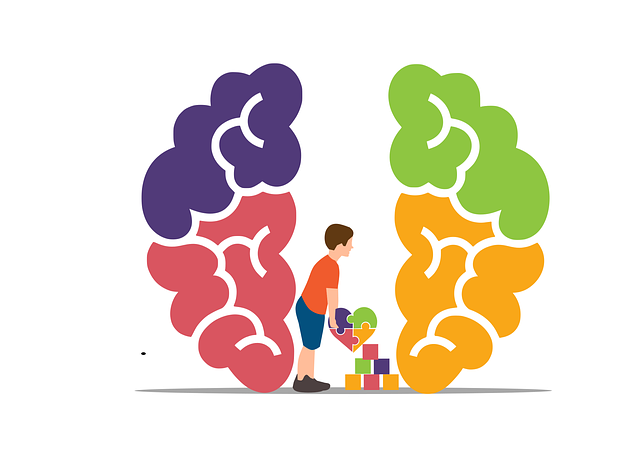Longmont Child Abuse Therapy develops a mental wellness app, combining traditional therapy with digital tools for personalized support. The app offers interactive self-assessments, mindfulness exercises, and psychoeducation, enabling remote monitoring by therapists to mitigate risks. With evidence-based stress reduction methods and emotional intelligence techniques, the app aids young minds in building resilience and self-esteem through games, storytelling, and guided exercises. Prioritizing security, user-friendliness, and age-appropriate content, it complements face-to-face sessions and equips parents with tools to support their child's journey at home, revolutionizing children's mental health care.
Mental wellness apps are transforming modern therapy by providing accessible, personalized support. This article delves into this burgeoning trend, focusing on the importance of mental health technology in addressing contemporary challenges. We present a case study of Longmont Child Abuse Therapy, demonstrating successful app development for children’s emotional well-being. Furthermore, we explore key features and considerations for building secure, user-friendly mental health applications, emphasizing best practices learned from real-world implementations like Longmont.
- Understanding the Need for Mental Wellness Apps in Modern Therapy
- Developing an Effective App for Children's Emotional Well-being: A Case Study of Longmont Child Abuse Therapy
- Key Features and Considerations for Building Secure and User-Friendly Mental Health Applications
Understanding the Need for Mental Wellness Apps in Modern Therapy

In today’s fast-paced and often stressful world, mental wellness is more important than ever. Longmont Child Abuse Therapy highlights the growing need for accessible, personalized support for individuals dealing with various mental health challenges. Mental wellness apps have emerged as a game-changer in modern therapy, offering convenient and effective solutions. These applications cater to a wide range of users, from those seeking stress management techniques to individuals in need of professional counseling services.
By incorporating Mind Over Matter principles, these apps provide interactive tools for self-assessment, mindfulness exercises, and psychoeducation. They also facilitate communication between therapists and clients, ensuring continuous care. Moreover, with the integration of risk assessment features, mental health professionals can remotely monitor patient progress and make informed decisions, especially pertinent in evaluating potential risks within Longmont Child Abuse Therapy settings.
Developing an Effective App for Children's Emotional Well-being: A Case Study of Longmont Child Abuse Therapy

In an era where mental health awareness is increasingly taking center stage, the development of targeted apps for children’s emotional well-being has emerged as a game-changer. A prime example is Longmont Child Abuse Therapy, an organization that has leveraged technology to offer innovative solutions for young minds facing various challenges. Their app, designed with child psychologists and therapists, goes beyond mere entertainment, integrating evidence-based stress reduction methods and incorporating elements of emotional intelligence to foster healthy coping mechanisms.
The application prioritizes age-appropriate content, focusing on building resilience and self-esteem through interactive games, storytelling, and guided exercises. By combining traditional therapy techniques with digital engagement, Longmont Child Abuse Therapy’s app ensures that children can access support in a comfortable and familiar digital space. This approach not only complements face-to-face therapy but also empowers parents by providing them with tools to actively contribute to their child’s self-esteem improvement journey from the comfort of their homes.
Key Features and Considerations for Building Secure and User-Friendly Mental Health Applications

When developing a mental wellness app, prioritizing security and user-friendliness is paramount. Incorporating robust encryption protocols ensures sensitive personal data, including histories of therapy sessions or private thoughts, remains confidential, fostering trust between users and the application. Features such as secure multi-factor authentication, regular security updates, and clear privacy policies communicate the app’s commitment to protecting user information, addressing concerns common in mental health spaces like Longmont Child Abuse Therapy.
User experience plays a significant role in the success of any mental wellness app. Intuitive navigation, accessible language, and customizable interfaces cater to diverse needs and preferences, encouraging consistent use. Integrating evidence-based practices like Emotional Intelligence techniques or incorporating Stress Reduction Methods through guided meditations or mood tracking can enhance user engagement while facilitating Emotional Healing Processes.
Mental wellness apps, as demonstrated by the success of programs like Longmont Child Abuse Therapy’s digital interventions, are transforming modern therapy. By prioritizing user-friendliness and integrating secure features, these applications effectively support emotional well-being, especially for children. As we navigate an increasingly digital world, further development in this space holds immense potential to improve mental health outcomes for diverse populations.














